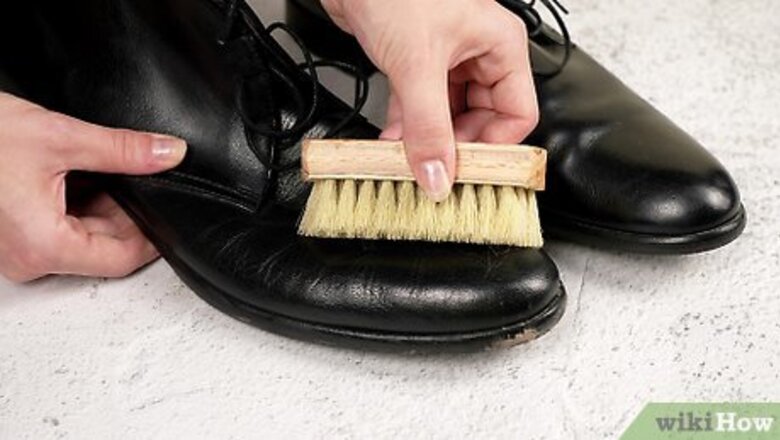
views
Cleaning and Polishing Leather Shoes

Brush or wipe away surface dirt and debris. Use the horsehair brush that comes with many shoe cleaning kits, or another soft-bristled brush. Alternatively, you can use a piece of clean, soft, lint-free cloth, like a strip of an old t-shirt. The more often you do this basic surface cleaning — e.g., every time you take the shoes off — the easier it and the rest of the cleaning process will be. Save your old t-shirts for shoe cleaning and polishing. They’ll come in handy often. Remove the laces from the shoes before continuing; they’ll just get in the way.
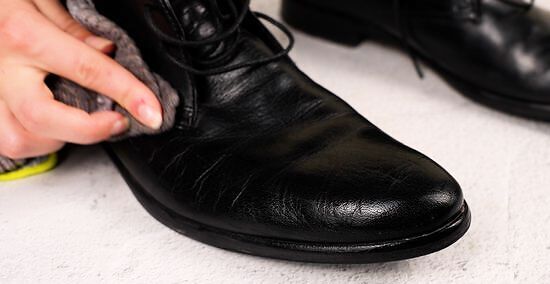
Rub away stubborn dirt, scuffs, and stains. Lightly moisten another clean cloth and work in a small amount of either saddle soap or leather shoe cleaner. Rub the shoe firmly but not aggressively. For stains caused by road salt, try applying a two-to-one mix of water and white vinegar with a clean cloth. Lightly dampen the leather; don’t saturate it with the solution. If you have caked-on, clumpy layers of old polish to contend with, try adding a bit of nail polish remover (acetone) to cotton balls and wiping gently. This should remove the old polish.

Nourish the leather after letting the shoes dry. Give the shoes a bit of time to dry fully if you used any liquids in the cleaning process, then apply your chosen product to make the leather more soft and supple. You can use a leather conditioner, saddle soap, or an oil renovator (like mink oil), all of which can be found alongside other shoe repair products. Follow the product instructions for application, but remember that a little goes a long way no matter what you’re using.

Polish the shoes. Choose either a wax or cream polish, or even start with a layer of cream followed later by wax. Shoe cleaning kits include a brush meant for polishing, but a strip of old t-shirt fabric works quite well also. Apply a small amount of polish to the brush or cloth, and work it onto the shoe with a circular motion. It’s better to add small amounts of polish multiple times than to glop on too much at once, so take your time. After you’ve finished applying a coat of polish, buff the shoes using a clean cloth and the same circular motion. Buffing evens out the wax, helps work it into the leather, and removes excess. If you want to add one or more additional layers of polish, let the shoes dry for a short while between rounds, and always buff after polishing.
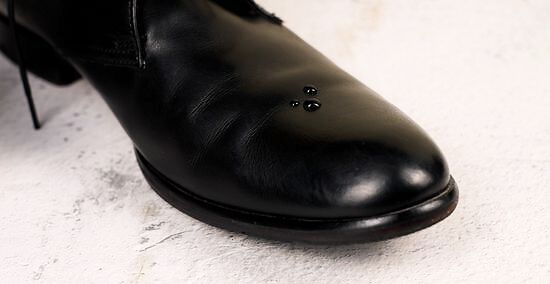
Add a “spit-shine,” if desired. If your goal is a mirror-like sheen on your shoes, polish and buff at least twice apiece. Then, after the shoes dry a little, sprinkle a few drops of water on them and buff them with the cloth used to apply the polish. Keep repeating this process (with brief drying intervals) to further enhance the shine. If possible, let the shoes dry overnight, then give them one final buff with a dry cloth.
Cleaning Other Dress Shoe Materials
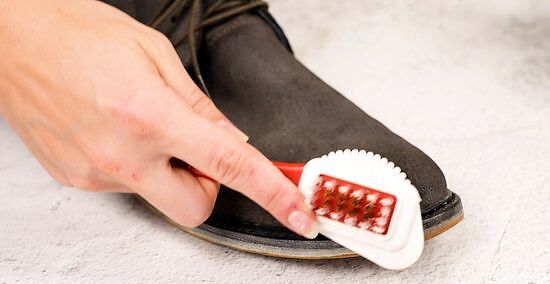
Clean suede shoes with special tools and techniques. Buy a suede brush, and use this to remove general dirt and debris with gentle brushing in a consistent direction — that is, don’t rub back-and-forth or in circles. However, for scuff marks, brush more vigorously and back-and-forth with the brush, then gently in one direction. Rubbing a suede eraser or even a regular pencil eraser on a stubborn scuff mark can also help. If you must use water to clean a stubborn stain (or need to remove a water stain), wet the entire shoe lightly and then blot it dry thoroughly. When the shoe is dry, use the suede brush to restore the texture. Apply a spray-on suede protector after cleaning and on a regular schedule, as per the product directions.
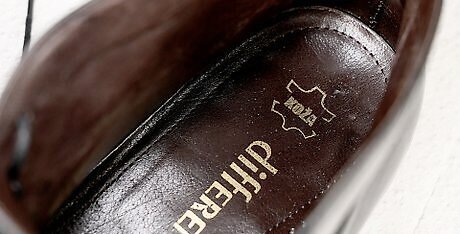
Clean untreated leather shoes differently than treated leather. Most leather dress shoes are made of treated leather, but you may have a nice pair of untreated leather shoes or boots that need cleaning. Check the tag on the shoes to determine if the leather is treated or untreated. For either type of leather, use a soft brush or cloth to gently wipe away dirt and debris. To give untreated leather a deeper clean, use saddle soap. Moisten a clean cloth, then rub a small amount of the soap onto it. Gently rub it onto the shoes, then wipe away the lather. Let the shoes dry thoroughly. Protect untreated leather with mink oil. Apply a small amount using a clean cloth, then buff it with another clean cloth.

Clean satin shoes carefully. Satin shoes are a common accompaniment to women’s formal wear (like a prom or wedding dress), since they can be dyed to match the dress color. A deep cleaning isn’t really possible with these delicate shoes, but you can remove minor debris and scuffing. Wipe the shoes with a dry cloth. Mix a small amount of oil-based soap with water, dampen a clean cloth with the mixture, and rub it gently over the entire shoe. Scrub a bit harder (in a circular motion) for more stubborn stains or scuffs. Allow the shoes to dry overnight or longer before wearing them. Re-dyeing the shoes may also help with stains or fading.












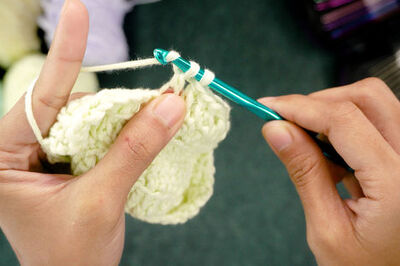



Comments
0 comment